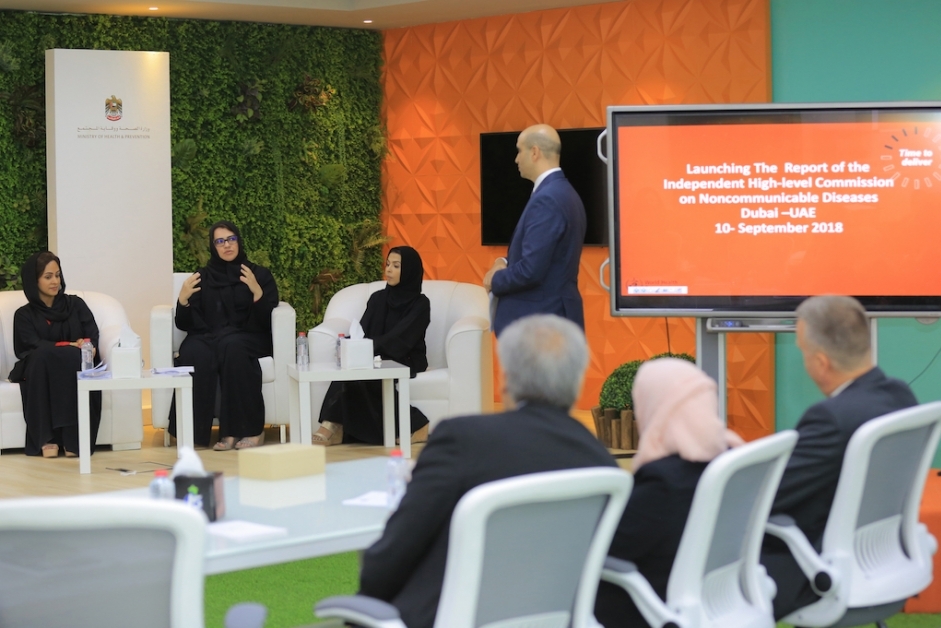
Friends of Cancer Patients Urges Stronger Nationwide Action to Combat NCDs
The World Health Organisation (WHO) launched the High-level Commission Report on Noncommunicable Diseases (NCDs) and Mental Health on September 10, in collaboration with Ministry of Health and prevention and the national NCD committee in the UAE.
On the occasion, Friends Of Cancer Patients (FOCP), a UAE-based cancer charity, member of the UAE’s National Non Communicable Diseases committee and The Eastern Mediterranean Non Communicable Diseases Alliance , and organiser of the 2015 and 2017 editions of the Global NCD Alliance Forum, has reiterated that stronger commitment by governments and heads of state to preventing and reversing the effects of this global epidemic, which takes over 40.5 million lives each year, will be key to attaining the United nations sustainable developments goals 2030 target set for NCDs.
When countries agreed on the Sustainable Development Goals in 2015, they committed themselves to a specific NCD target stipulating a one-third reduction of premature NCD mortality by 2030 (SDG target 3.4).
The HLC report highlights that despite the many proven interventions and commitments to combat NCDs, progress has been slow and uneven globally due to challenges ranging from lack of political will and priority setting, the impact of economic, commercial and market factors, and insufficient financing and capacity.
The Commission makes six recommendations in its report:
-
Start from the top: Heads of State and Government should take responsibility for the NCD agenda, rather than delegating it to ministers of health alone, as it requires collaboration and cooperation across many sectors.
-
Prioritize and scale up: Governments should identify and implement a specific set of priorities within the overall NCD and mental health agenda, based on public health needs.
-
Embed and expand: Governments should reorient health systems to include NCDs prevention and control and mental health services in their universal health coverage policies and plans.
-
Collaborate and regulate: Governments should increase effective regulation, appropriate engagement with the private sector, academia, civil society, and communities.
-
Finance: Governments and the international community should develop a new economic paradigm for funding actions on NCDs and mental health.
-
Act for accountability: Governments need to strengthen accountability to their citizens for action on NCDs and simplify existing international accountability mechanisms.
HE Sawsan Jafar, Chairperson of FOCP Board of Directors, observed: “The recommendations of the WHO high-level commission report come as a much-needed push for governments and political leaders to place combating NCDs on the top of their list of public health priorities as they impact millions of lives around the world at a rate never seen before. FOCP has been dedicated to mobilising high-level political leadership and healthcare institutions, and has offered over 4,000 members of society the resources and financial support for the treatment of cancer since 1999, under the vision and patronage of Her Highness Sheikha Jawaher bint Mohammed Al Qasimi, Wife of His Highness the Ruler of Sharjah, Founder and Royal Patron of Friends of Cancer Patients (FOCP) and International Ambassador for the World Cancer Declaration of the Union for International Cancer Control (UICC), International Ambassador for Childhood Cancer for UICC and patron of the global NCDA forum.
“In the past 15 years, the NCD epidemic has been further intensified by poverty, easy access to health-harming products, rapid urbanization and population growth. All these factors have snowballed into a global health tsunami, which is undermining the health and productivity of populations and crippling economies. We need to take a collective global decision to save the hundreds of millions of lives, who are ultimately responsible for meeting national development goals, and more importantly, deserve to live healthy and quality lives.” She added.
Dr. Ibtihal Fadhil, Chair-Regional NCD Alliance, added: “The burden of cancer, diabetes, cardio-vascular diseases and their main risk factors (tobacco use, obesity, unhealthy diet) is becoming ever more prominent in our region. There is urgency to act now. Taking decisive action on NCDs will not only save lives, but also lower health spending and accelerate progress towards achieving sustainable development goals 2030.”
In November 2015, HH Sheikha Jawaher Al Qasimi launched the ‘Sharjah Declaration’ on NCDs during the first Global NCDA Forum which acts as a road map to civil society by engaging in advocacy and accountability which advances the NCD response and signals an important shift in focus to translate global commitments into national action. Endorsed by 230 international experts, the declaration includes the most important recommendations from the forum, which is being applied to achieve the 2030 Agenda for Sustainable Development.
As a founding board member of the Eastern Mediterranean Non-Communicable Disease Alliance (EMNCDA), FOCP also held the first ever EMNCDA meeting in July 2017, which saw its ten member-countries come together to focus on the causes, prevention, management and control of non-communicable diseases, and the policies and strategies needed to achieve the Alliance’s aims.
Through the dissemination of the information contained within the WHO report, FOCP seeks to sensitise both organisations and civil society, increase their awareness about the strong influence that commercial and social factors have on one’s health, thereby supporting and encouraging them to make the right choices.
According to the US NCDS Prevention and Control Centres, non-communicable diseases are a group of chronic diseases that are not transmitted from one person to another, and are usually are developed through a prolonged period within a relatively slow process. NCDs include seven main groups: Cardiovascular diseases (like heart attacks and stroke), cancers, chronic respiratory diseases, kidney diseases, multiple sclerosis, liver diseases and diabetes.



























